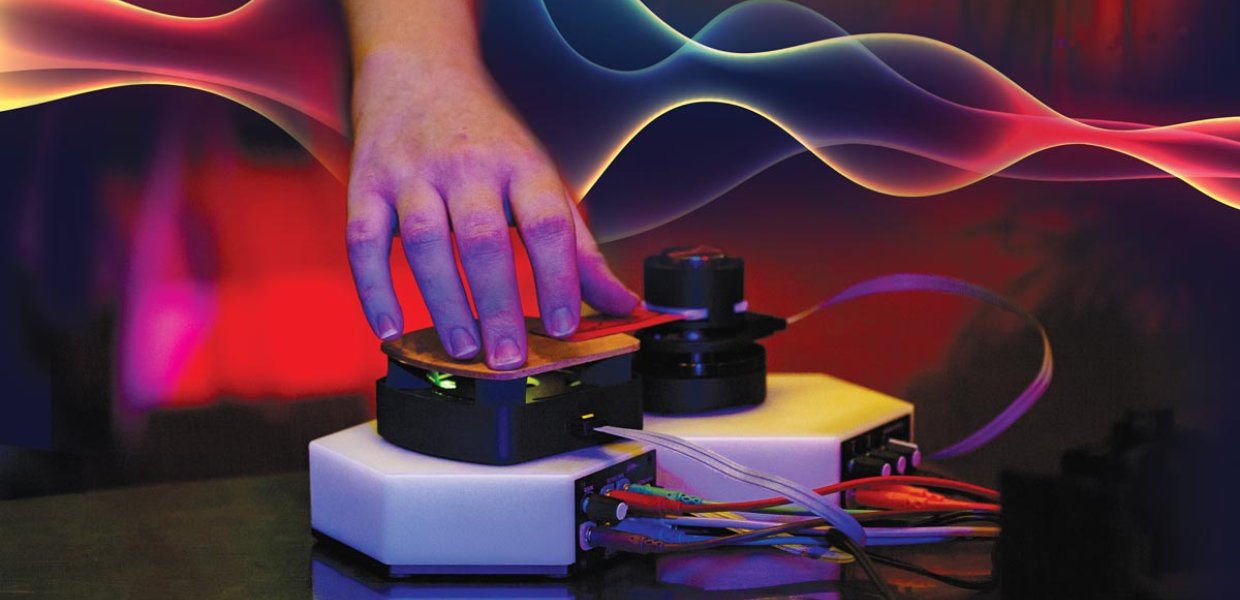I waited for Spencer Topel in the dead of night, eight years ago, outside the only convenience store in Vermont. As his undergraduate research assistant at Dartmouth College, I agreed to help shoot a documentary for his sound art installation. I didn’t realize filming was only possible at midnight, without the shifting sun. The rumble of his four-cylinder sedan cut through the sleeping town as he pulled into the parking lot.
“You ready?” Spencer asked. I mustered a nod and then slid in shotgun. Little did I know that our ride into the night would produce one of my most enduring friendships and the invention of an award-winning instrument — Cicada.
Three months prior, near the end of my freshman year, I was desperate for a summer research project in either math or music, two of my majors. To my surprise, Spencer, a music professor, found a way to combine both. He called it sound synthesis. I reached out and we met at a burrito shop.
Synthesis, Spencer explained over nachos, was mankind’s endeavor to create and manipulate sound. “Think the turntable,” he said. “This machine converted minuscule bumps on vinyl into sound.” Spencer went on to share that his goal was to produce modulation acoustically, which was traditionally a technique only possible in electronic music. He asked if I was on board. I told him I was.
That summer, I spent idyllic afternoons perusing old instrument manuals. I stripped wire with my canines, then soldered the exposed copper with beads of lead. I tested rhizomes of cables and speakers. With my newfound engineering prowess, I built our first prototype — a tuning fork instrument capable of acoustic modulation.
With Spencer’s mentorship, we wrote a paper about our prototype and submitted it to New Interfaces for Musical Expression. The paper was accepted six months later.
My first conference in Australia was everything I wished for — halfway across the globe paired with cuddles from a koala. It seems funny to me that an obsession with sound in rural New England pushed me into my subsequent career in research at USC.
I first studied Artificial Intelligence at the University of Edinburgh in Scotland, before coming to USC Annenberg for my PhD in communication. Here, I research human behavior on online social networks. While this may appear like a sharp transition, I’d like to think I’m asking similar questions: How people use technology, how we reconcile our intuition and logic. And how misinformation and synthesis share this juncture of rationality and emotion.
In the Spring semester of my first year, COVID-19 hit, and I returned home to virus-free Taiwan to attend school remotely. At the same time, Spencer left academia to launch Physical Synthesis — a startup for our instrument. He set up shop in Brooklyn and asked if I knew any manufacturers. Down the street from where I lived were some of the best machining shops in Asia.
So began a serendipitous routine: Wake at 3 a.m. for my computational social science Zoom seminar. Visit a machine shop at 7:20 a.m. Research in the afternoon. At 10 p.m., go over prototypes at a late-night café. Within a year, we had our first batch of Cicadas.
What exactly is Cicada? Cicada is a modular acoustic synthesizer. A vibrating metal wing that gently rests on a soundboard, like the tip on a turntable, transforming electronic signals into delicate vibrations. Soundscapes are sculpted physically, like a violin or drum. Sampling — the process of recording snippets for a soundtrack — becomes intuitive when control is through the subtlety of touch, instead of the cold roll of aluminum knobs.
Following our release came our first partnering artists and YouTube reviews. Once I returned to Los Angeles to continue my studies in person at Annenberg, I packaged our seven-year journey into a video and then applied to the Guthman Musical Instrument Competition. Four months later, we were flying to Atlanta for the finals.
Held annually at Georgia Tech, the competition showcases 10 of the world’s most innovative instruments from hundreds of applications. We showcased what made Cicada unique by driving it through the strings of a Chinese Guqin to create an ethereal soundscape. We won the Judge’s Special Award.
Although Cicada is just one line on my résumé, I learned publishing and patent filing, contract negotiating, and music making. More importantly, especially at a place like USC that hosts communities of artists or social scientists, it’s the invisible conversation and connections that I learned matter the most.
There’s beauty in sharing ownership of something fleeting, like sound, like music.
Watch the Cicada demonstration below.
